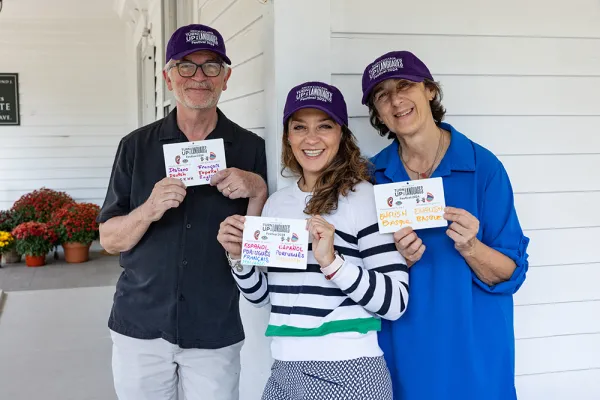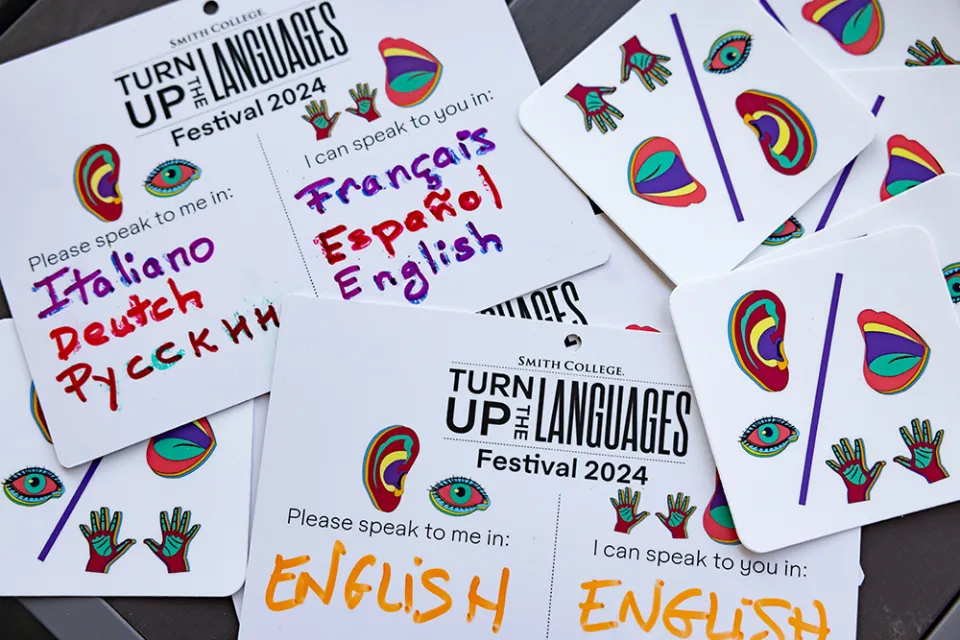Building Community Through Languages
Research & Inquiry
A weeklong festival highlights Smith’s rich, multilingual tapestry
Co-coordinators of the Turn Up the Languages festival at Smith are (from left) Professor Christophe Golé, Instructional Technologist Abril Navarro, and Associate Professor Reyes Lázaro.
Published September 23, 2024
Arabic, Portuguese, Shona, Spanish, French, and Mandarin are just a few of the languages spoken at Smith.
A new festival of languages, kicking off September 30 and running through October 7, will bring that diversity into the spotlight through events and activities celebrating multilingualism on campus.
“Turn Up the Languages” will offer students, faculty, and staff opportunities to speak, listen to, and learn about languages. No advanced preparation, knowledge of another language, or level of ability is required. Participants can sign up to wear badges indicating what languages they speak—or want to hear spoken. The festival has already drawn close to 300 interested participants.
“Wearing the badge means you want to play at communicating with others in bilingual or even trilingual conversations,” says Reyes Lázaro, an associate professor of Spanish who came up with the idea for the festival. “We have a wealth of languages at Smith and we want to celebrate them loudly, clearly, playfully, and joyfully.”
This inspiration for the weeklong festival grew out of Lázaro's experience growing up in the Basque region of northern Spain. During the dictatorship of Francisco Franco from the late 1930s to the mid-1970s, it was forbidden to speak or study Euskara, the Basque language, and Spanish remains the dominant language in the region.
In recent years, the Basque government has hosted a celebration called Euskaraldia (or Basque’s Turn) to empower people to use Euskara. For 11 days, participants wear badges in the shape of either a mouth, to indicate they speak Basque, or an ear, to show they’d like someone to speak to them in Basque.
“The idea is to try and change social attitudes about having conversations in only the dominant language and to support languages that are in the minority,” Lázaro says. “I thought, something like this surely could happen at Smith.”
Last semester, Lázaro and festival co-coordinators Professor Christophe Golé and Instructional Technologist Abril Navarro, organized a short-term project at the Kahn Liberal Arts Institute, “Blending Words: Toward a Festival of Languages.” That project developed into the campus-wide celebration, thanks to the efforts of a group of 22 faculty, staff, and students who spent the spring planning a week of activities focused on multilingualism.
Navarro, who speaks Spanish and a “bit of Portuguese,” says she has been looking for ways to elevate languages other than English at Smith—including those spoken by staff members.
“It’s important for people to be able to speak in their native languages and not feel excluded,” she says. “Language is a way of representing yourself and your identity. And hearing other languages rejects the idea that having an accent makes you less intelligent or capable.”
Golé, a professor of mathematical sciences who speaks French and Spanish, says the festival is also a way to enjoy learning opportunities outside of the classroom. “There are many languages people speak at Smith and not all of them are being taught,” he says. “We should celebrate those languages, as well—and in a way that’s a lot of fun!”
In addition to sparking campus-wide conversations, “Turn Up the Languages” will feature:
- A poetry and lecture event on Monday, Oct. 7, with Ross Perlin of Columbia University, co-director of the Endangered Languages Alliance and author of Language City: The Fight to Preserve Endangered Mother Tongues in New York;
- An interactive exhibit at Nolen Art Lounge in the Campus Center titled “Therapy for Monolinguals”;
- Upcoming music and dance events that will be announced on the festival website, along with instructions about where to get a badge.
Organizers hope the festival—which is also open to members of the Five College community—will become an annual tradition at Smith, one that inspires people to feel more confident about using and learning about multiple languages.
Suzanne Gottschang, professor of anthropology and director of the Kahn Institute, says “the enthusiastic interdisciplinary collaboration from sponsors and individuals across the campus affirms a place for languages other than English at Smith.”
The heart of the project is building community, Lázaro says. “Multilingualism is an asset for the entire community,” she says. “Students love it and it could become a trademark of Smith.”
“Let’s hear all the languages Smith has to offer!” adds Navarro.

